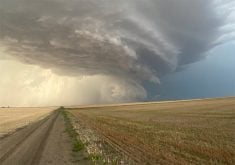In the last article, we discussed the way volcanoes can impact day-to-day weather and also the climate of the planet over extended periods of time.
Volcanoes, for the most part, have a cooling effect on our planet. The ash and sulfur dioxide propelled into the atmosphere from the eruption tend to block incoming solar radiation, resulting in an overall cooling effect.
Not all volcanic eruptions result in atmospheric cooling. If an eruption contains more water vapour and carbon dioxide than ash and sulfur dioxide, atmospheric warming can occur as these gases trap outgoing long-wave radiation.
Read Also

Farmers asked to keep an eye out for space junk
Farmers and landowners east of Saskatoon are asked to watch for possible debris in their fields after the re-entry of a satellite in late September.
Now let’s consider the Tonga volcanic eruption that occurred on Jan. 15, 2022, and how it could be partly responsible for the record-breaking global temperatures in 2023. Some of the people who have written to me about this wish I would say this eruption is wholly responsible for the record-breaking temperatures, but that is just not true.
The planet was into a full year of El Nino conditions across the Pacific Ocean, which leads to warmer global temperatures. Put that on top of already rising global temperatures due to human-induced warming, and it was already predicted to be a near or record-breaking year.
What caught people off guard was the extreme to which the record was broken.
The undersea Tonga eruption was one of the biggest to occur on Earth in the last 1,500 years. It was different from most other large eruptions. In addition to large amounts of particulate matter sent into the atmosphere, it also ejected a huge amount of water vapour, enough to fill an estimated 58,000 Olympic-sized swimming pools.
On top of this, the eruption was powerful enough to push water vapour through the active layer, or troposphere, and into the stratosphere. Researchers estimate there was a 10 percent increase in total water vapour in the stratosphere. It is also estimated that this water vapour in the stratosphere will remain there for several years.
This eruption was so efficient at pushing water vapour into the atmosphere because of its depth. At about 150 metres deep, a large amount of water was above the volcano, but not so deep that the pressure of the water could mute the power of the explosion.
Water vapour is a very good greenhouse gas, much better than CO2. It accounts for 60 to 70 per cent of the greenhouse effect, while CO2 accounts for about 25 per cent. Methane, on the other hand, is more potent than either of these.
The real question is how much of an impact the Tonga eruption and release of all that water vapour had on global temperatures.
Research published in January 2023 in Nature Climate Change indicated the eruption likely resulted in a 0.035 degree C increase in global temperatures. That’s far short of the 0.17 C difference between the old global temperature record and what was achieved in 2023.
What is the long-term impact of the stratospheric water vapour? We are not sure. The latest research suggests that stratospheric warming makes up about five percent of the total amount of surface warming. There were predictions that global temperatures would likely surpass 1.5 C sometime in the next few years, but the increase in global stratospheric water vapour has increased this probability.
Overall, the Tonga eruption did contribute to last year’s record-breaking heat across the planet, but it doesn’t appear to be the main cause of that record. Rather, it was one of several things that combined to result in record heat.
Daniel Bezte is a teacher by profession with a BA in geography, specializing in climatology, from the University of Winnipeg. He operates a computerized weather station near Birds Hill Park, Man. Contact him at dmgbezte@gmail.com.


















